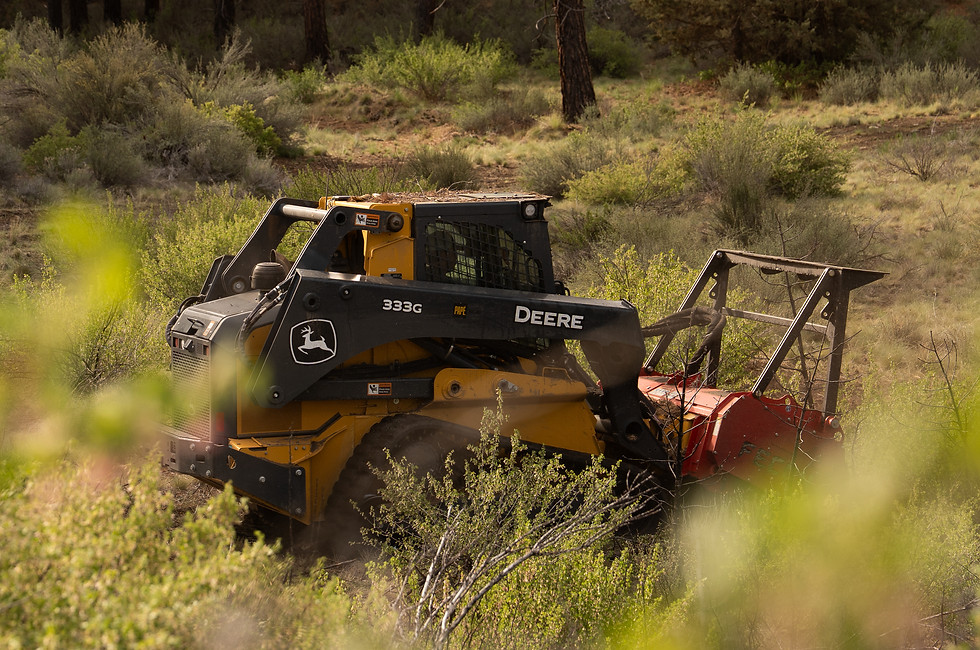Benefits of Forestry Mulching

Fires can have severe consequences on the environment, particularly in forested areas where wildfires can lead to the loss of habitat and biodiversity. Wildfires also contribute to air pollution, emitting harmful particles and greenhouse gasses that can affect air quality and exacerbate climate change. Preventing fires through responsible land management practices and public education helps protect natural ecosystems and supports the long-term health of our planet.
Prioritizing fire prevention is essential to ensure the safety of individuals, protect property and infrastructure, and safeguard the environment. Through a combination of education, planning, and proactive risk management, we can significantly reduce the frequency and impact of fires in our communities.
Forestry mulching, a land management technique, offers numerous benefits in various aspects of environmental and economic sustainability. Some of the key benefits of forestry mulching include:
Soil Erosion Prevention and Soil Fertility Improvement
Mulching helps to prevent soil erosion by providing a protective layer on the soil surface. This layer shields the soil from direct sunlight and heavy rainfall, minimizing the risk of topsoil loss. Additionally, as the mulch decomposes, it enriches the soil with nutrients, improving soil fertility and structure.
Water Conservation
Mulching aids in water conservation by reducing evaporation and enhancing water infiltration. This enables plants to access water more effectively and reduces the need for frequent watering. As a result, the overall water usage is minimized, and water resources are conserved.
Weed Suppression and Pest Control
Mulching suppresses weed growth by limiting the sunlight that reaches the soil surface, reducing weed germination. It also creates a physical barrier that makes it difficult for existing weeds to penetrate the soil. Furthermore, certain types of mulch can deter pests, minimizing the need for chemical pesticides.
Carbon Sequestration
Mulching contributes to carbon sequestration, a process that captures and stores atmospheric carbon dioxide. As the mulch decomposes, carbon is stored in the soil, helping to reduce greenhouse gas emissions and mitigate the impacts of climate change.
Improved Aesthetics and Land Value
Mulching enhances the visual appeal of a property by providing a clean, uniform appearance. This can increase property values and attract potential buyers or tenants. Moreover, the reduced maintenance requirements associated with mulched areas can result in long-term cost savings.
Wildlife Habitat Restoration
Forestry mulching plays a vital role in restoring and maintaining natural ecosystems. By controlling invasive species and creating a favorable environment for native plants, mulching helps to reestablish habitats that support local wildlife.
Forestry mulching offers a multitude of benefits, including soil erosion prevention, water conservation, weed suppression, carbon sequestration, aesthetics improvement, and wildlife habitat restoration. These benefits demonstrate the importance of forestry mulching as an essential component of sustainable land management practices.
Skid Steer Masticators:
The Ultimate Land Clearing Solution

When it comes to land clearing, there's no better tool than a skid steer masticator. This powerful machine makes quick work of even the most stubborn vegetation, leaving behind a clean and level surface. In this article, we'll explore the benefits of skid steer masticators, their definition, and some helpful sources for more information.
What is a Skid Steer Masticator?
A skid steer masticator is a heavy-duty attachment for a skid steer loader that is designed to mulch and clear vegetation. It uses a rotating drum or disc equipped with sharp teeth to grind and shred trees, brush, and other types of vegetation into small pieces. This powerful tool can quickly and efficiently clear large areas of land, making it an ideal choice for a variety of applications.
Benefits of Skid Steer Masticators
There are many benefits to using a skid steer masticator for land clearing, including:
• Efficiency: Skid steer masticators are incredibly efficient, making quick work of even the toughest vegetation. This means less time and labor spent on land clearing, resulting in significant cost savings.
• Versatility: These machines can handle a wide range of vegetation types, from small brushes to trees with a diameter of 10 inches. This makes them an ideal choice for a variety of land clearing applications.
• Environmental Friendliness: By mulching vegetation in place, skid steer masticators help to preserve the natural ecosystem of the area. This reduces erosion and promotes healthy regrowth, making them a more environmentally friendly option than traditional land clearing methods.
In conclusion, skid steer masticators are a powerful and efficient tool for land clearing. With their many benefits, they're an ideal choice for a variety of applications.
